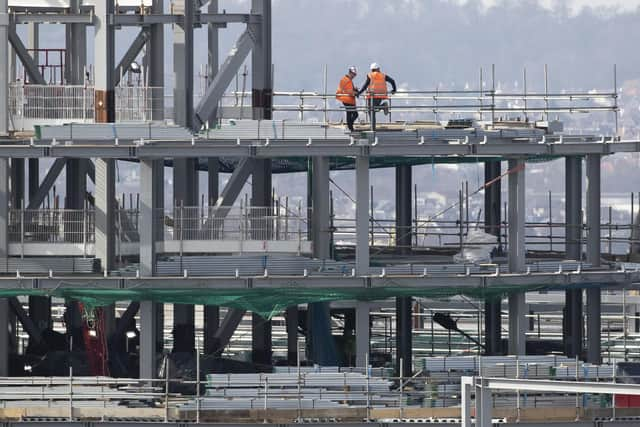Scotland powering construction sector’s Covid recovery despite supply shortages
The latest construction index from market analyst Glenigan reveals quarterly growth of 124 per cent on the value of project starts compared with a year earlier, despite a 15 per cent fall compared with the previous three months of this year.
UK-wide, the value of underlying work (less than £100 million in value) was up 35 per cent on 2020 figures but down 16 per cent on the preceding three months, on a seasonally adjusted basis.
Advertisement
Hide AdAdvertisement
Hide AdThe report provides a comprehensive analysis of year-on-year construction data, giving the sector a “unique insight” into results from the second quarter of 2021 and the last 12 months.


The value of residential work being carried out on-site is on the rise, Glenigan noted, climbing 36 per cent UK-wide against the previous year. However, this fell 28 per cent compared with the preceding three months, seasonally adjusted, and is down 33 per cent on 2019’s pre-pandemic figures.
Private housing has shown growth as one of the best-performing sectors, with the value of project-starts rising by 54 per cent, year on year.
Retail was a “stand-out” sector during the latest period, with project-starts having increased 150 per cent against the previous year, and up 34 per cent compared with the same period in 2019. Retail-starts also increased 83 per cent compared with the preceding three-month period.
Despite a dip in health project starts in the second quarter of this year, down 12 per cent on the first quarter, the sector has seen a 7 per cent rise on the previous year and a 43 per cent increase on the same period in 2019.
Hotel and leisure project-starts have performed poorly in recent months, however, sector growth has nearly doubled against the previous year (94 per cent) and increased 52 per cent on the opening three months of 2021.
An area “in need of improvement” is underlying civil engineering project-starts, which lifted just 1 per cent on 2020 and fell 41 per cent on the preceding three months. This was also down 40 per cent compared with the same period in 2019.
Rhys Gadsby, Glenigan’s economic analyst, said: “The positive figures we’ve seen in Scotland serves as a strong indicator the construction sector recovery is not limited to London and the south east. However, they should be note of caution.
Advertisement
Hide AdAdvertisement
Hide Ad“While the value of project-starts remains substantially higher than the lockdown-affected previous year, the value has continued to decline in recent months. Material supply problems may have contributed to the fall; however, a decline was expected following a surge in activity, due to pent-up demand, during the first quarter.”
A recent report suggested that more than 26,000 jobs will need to be created over the next four years to keep Scotland’s construction sector on track after a strong rebound from the pandemic.
The industry is expected to grow by an annual average rate of 4.1 per cent, recovering to pre-crisis growth levels by 2023, according to the study from the Construction Industry Training Board (CITB).
A message from the Editor:
Thank you for reading this article. We’re more reliant on your support than ever as the shift in consumer habits brought about by coronavirus impacts our advertisers. If you haven’t already, please consider supporting our trusted, fact-checked journalism by taking out a digital subscription: www.scotsman.com/subscriptions
Comments
Want to join the conversation? Please or to comment on this article.
